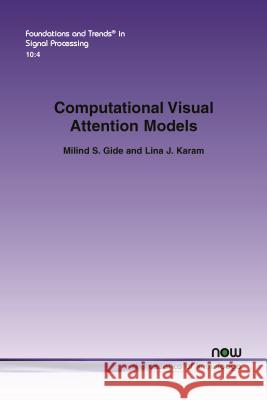Computational Visual Attention Models » książka
Computational Visual Attention Models
ISBN-13: 9781680832808 / Angielski / Miękka / 2017 / 98 str.
The human visual system has evolved to have the ability to selectively focus on the most relevant parts of a visual scene. This mechanism, referred to as visual attention, has been the focus of several neurological and psychological studies in the past few decades. These studies have inspired several computational visual attention models which have been successfully applied to problems in computer vision and robotics. Computational Visual Attention Models provides a comprehensive survey of the state-of-the-art in computational visual attention modeling with a special focus on the latest trends. By reviewing several models published since 2012, the theoretical advantages and disadvantages of each approach are discussed. In addition, existing methodologies to evaluate computational models through the use of eye-tracking data along with the visual attention performance metrics used are described. The shortcomings in existing approaches and approaches to overcome them are also covered. Finally, a subjective evaluation for benchmarking existing visual attention metrics is presented and open problems in visual attention are highlighted. This monograph provides the reader with an in-depth survey of the research conducted to date in computational visual attention models and provides the basis for further research in this exciting area.
The human visual system has evolved to have the ability to selectively focus on the most relevant parts of a visual scene. This mechanism, referred to as visual attention, has been the focus of several neurological and psychological studies in the past few decades. These studies have inspired several computational visual attention models which have been successfully applied to problems in computer vision and robotics.Computational Visual Attention Models provides a comprehensive survey of the state-of-the-art in computational visual attention modeling with a special focus on the latest trends. By reviewing several models published since 2012, the theoretical advantages and disadvantages of each approach are discussed. In addition, existing methodologies to evaluate computational models through the use of eye-tracking data along with the visual attention performance metrics used are described. The shortcomings in existing approaches and approaches to overcome them are also covered. Finally, a subjective evaluation for benchmarking existing visual attention metrics is presented and open problems in visual attention are highlighted.This monograph provides the reader with an in-depth survey of the research conducted to date in computational visual attention models and provides the basis for further research in this exciting area.











